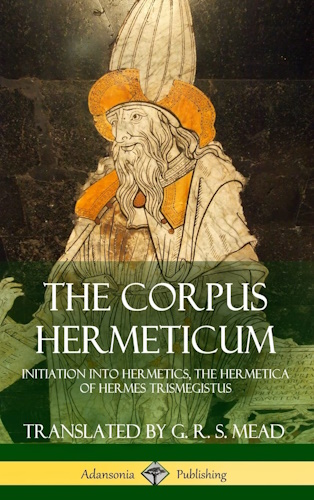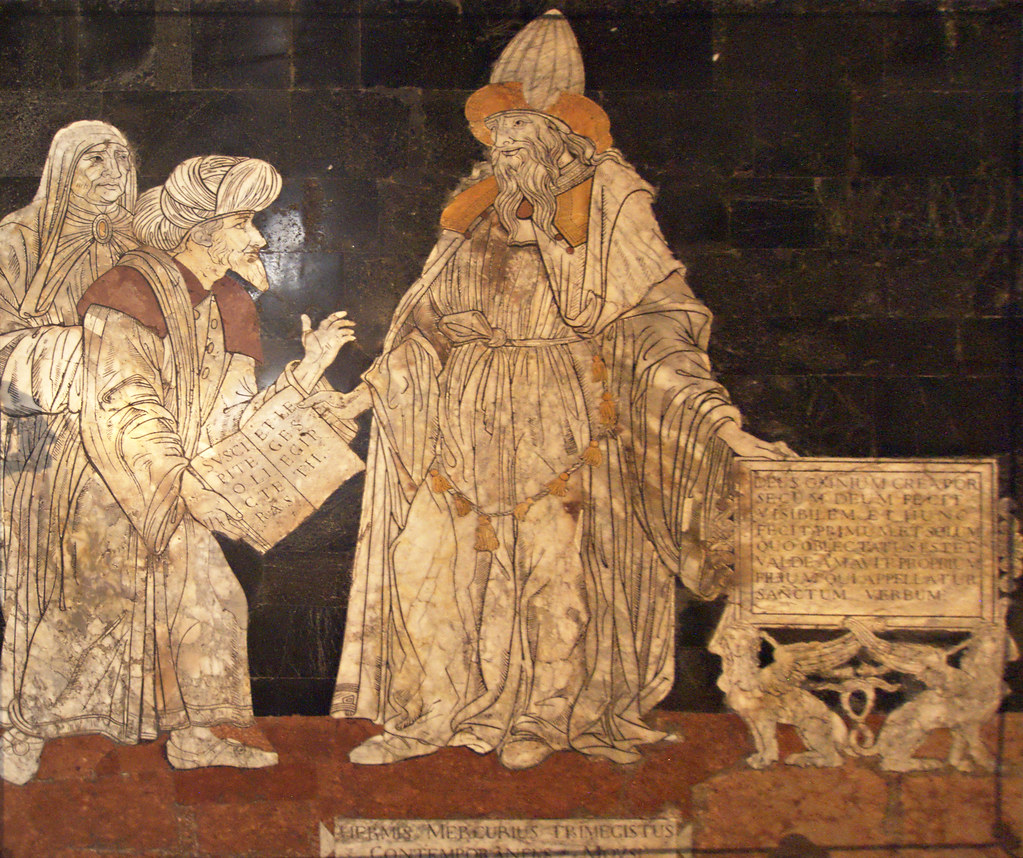
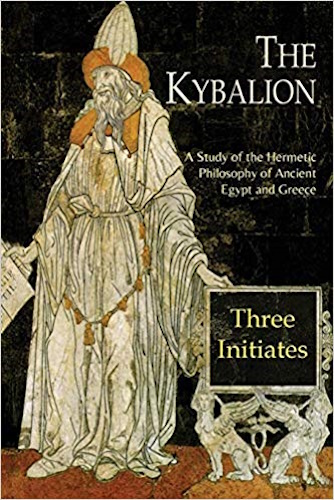

![Thrice-Greatest Hermes; Studies in Hellenistic Theosophy and Gnosis [Three Volumes in One] Thrice-Greatest Hermes; Studies in Hellenistic Theosophy and Gnosis [Three Volumes in One]](http://realityroars.com/images/affiliate-creative/thrice-greatest-hermes--studies-in-hellenistic-theosophy-and-gnosis.jpg)

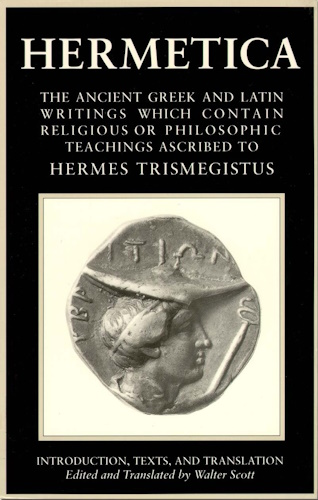



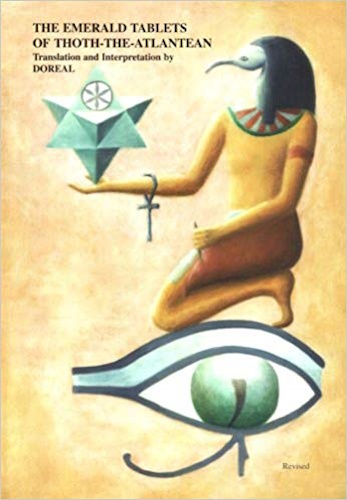

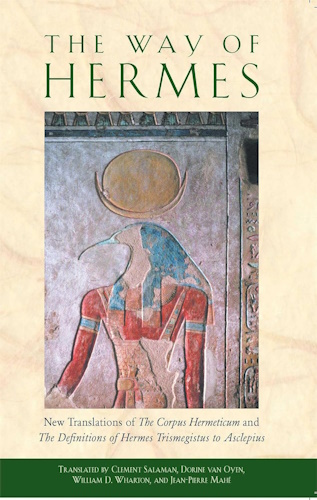

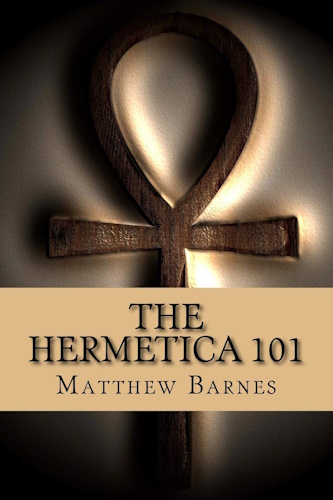

![]()
![]()
XII. About The Common Mind
<The "common mind" discussed in this dialogue is the same Mind which appears as a divine power in other parts of the Hermetic literature. It is identical, as well, with the "Good Daimon" whose words are quoted at several points here and elsewhere.
The Greek word logos - which means both "word" and "reason", among other things - is central to much of the argument, and it's unfortunate that English has no way to express the same complex of meanings. The praise of reason in parts 13-14 is also, and equally, a praise of human language, and this sort of double meaning plays a part elsewhere in this and other parts of the Hermetic literature. - JMG>
1. Hermes: The Mind, O Tat, is of God's very essence - (if such a thing as essence of God there be) - and what that is, it and it only knows precisely.
The Mind, then, is not separated off from God's essentiality, but is united to it, as light to sun.
This Mind in men is God, and for this cause some of mankind are gods, and their humanity is nigh unto divinity.
For the Good Daimon said: "Gods are immortal men, and men are mortal gods."
2. But in irrational lives Mind is their nature. For where is Soul, there too is Mind; just as where Life, there is there also Soul.
But in irrational lives their soul is life devoid of mind; for Mind is the in-worker of the souls of men for good - He works on them for their own good.
In lives irrational He doth co-operate with each one's nature; but in the souls of men He counteracteth them.
For every soul, when it becomes embodied, is instantly depraved by pleasure and by pain.
For in a compound body, just like juices, pain and pleasure seethe, and into them the soul, on entering in, is plunged.
3. O'er whatsoever souls the Mind doth, then, preside, to these it showeth its own light, by acting counter to their prepossessions, just as a good physician doth upon the body prepossessed by sickness, pain inflict, burning or lancing it for sake of health.
In just the selfsame way the Mind inflicteth pain on the soul, to rescue it from pleasure, whence comes its every ill.
The great ill of the soul is godlessness; then followeth fancy for all evil things and nothing good.
So, then, Mind counteracting it doth work good on the soul, as the physician health upon the body.
4. But whatsoever human souls have not the Mind as pilot, they share in the same fate as souls of lives irrational.
For [Mind] becomes co-worker with them, giving full play to the desires toward which [such souls] are borne - [desires] that from the rush of lust strain after the irrational; [so that such human souls,] just like irrational animals, cease not irrationally to rage and lust, nor are they ever satiate of ills.
For passions and irrational desires are ills exceeding great; and over these God hath set up the Mind to play the part of judge and executioner.
5. Tat: In that case, father mine, the teaching (logos) as to Fate, which previously thou didst explain to me, risks to be overset.
For that if it be absolutely fated for a man to fornicate, or commit sacrilege, or do some other evil deed, why is he punished - when he hath done the deed from Fate's necessity?
Hermes: All works, my son, are Fate's; and without Fate naught of things corporal - or <i.e., either> good, or ill - can come to pass.
But it is fated, too, that he who doeth ill, shall suffer. And for this cause he doth it - that he may suffer what he suffereth, because he did it.
6. But for the moment, [Tat,] let be the teaching as to vice and Fate, for we have spoken of these things in other [of our sermons]; but now our teaching (logos) is about the Mind: - what Mind can do, and how it is [so] different - in men being such and such, and in irrational lives [so] changed; and [then] again that in irrational lives it is not of a beneficial nature, while that in men it quencheth out the wrathful and the lustful elements.
Of men, again, we must class some as led by reason, and others as unreasoning.
7. But all men are subject to Fate, and genesis and change, for these are the beginning and the end of Fate.
And though all men do suffer fated things, those led by reason (those whom we said Mind doth guide) do not endure <a> like suffering with the rest; but, since they've freed themselves from viciousness, not being bad, they do not suffer bad.
Tat: How meanest thou again, my father? Is not the fornicator bad; the murderer bad; and [so with] all the rest?
Hermes: [I meant not that;] but that the Mind-led man, my son, though not a fornicator, will suffer just as though he had committed fornication, and though he be no murderer, as though he had committed murder.
The quality of change he can no more escape than that of genesis.
But it is possible for one who hath the Mind, to free himself from vice.
8. Wherefore I've ever heard, my son, Good Daimon also say - (and had He set it down in written words, He would have greatly helped the race of men; for He alone, my son, doth truly, as the Firstborn God, gazing on all things, give voice to words (logoi) divine) - yea, once I heard Him say:
"All things are one, and most of all the bodies which the mind alone perceives. Our life is owing to [God's] Energy and Power and Aeon. His Mind is good, so is His Soul as well. And this being so, intelligible things know naught of separation. So, then, Mind, being Ruler of all things, and being Soul of God, can do whate'er it wills."
9. So do thou understand, and carry back this word (logos) unto the question thou didst ask before - I mean about Mind's Fate.
For if thou dost with accuracy, son, eliminate [all] captious arguments (logoi), thou wilt discover that of very truth the Mind, the Soul of God, doth rule o'er all - o'er Fate, and Law, and all things else; and nothing is impossible to it - neither o'er Fate to set a human soul, nor under Fate to set [a soul] neglectful of what comes to pass. Let this so far suffice from the Good Daimon's most good [words].
Tat: Yea, [words] divinely spoken, father mine, truly and helpfully. But further still explain me this.
10. Thou said'st that Mind in lives irrational worked in them as [their] nature, co-working with their impulses.
But impulses of lives irrational, as I do think, are passions.
Now if the Mind co-worketh with [these] impulses, and if the impulses of [lives] irrational be passions, then is Mind also passion, taking its color from the passions.
Hermes: Well put, my son! Thou questionest right nobly, and it is just that I as well should answer [nobly].
11. All things incorporeal when in a body are subject unto passion, and in the proper sense they are [themselves] all passions.
For every thing that moves itself is incorporeal; while every thing that's moved is body.
Incorporeals are further moved by Mind, and movement's <i.e., movement is> passion.
Both, then, are subject unto passion - both mover and the moved, the former being ruler and the latter ruled.
But when a man hath freed himself from body, then is he also freed from passion.
But, more precisely, son, naught is impassible, but all are passible.
Yet passion differeth from passibility; for that the one is active, while the other's passive.
Incorporeals moreover act upon themselves, for either they are motionless or they are moved; but whichsoe'er it be, it's passion.
But bodies are invaribly acted on, and therefore they are passible.
Do not, then, let terms trouble thee; action and passion are both the selfsame thing. To use the fairer sounding term, however, does no harm.
12. Tat: Most clearly hast thou, father mine, set forth the teaching (logos).
Hermes: Consider this as well, my son; that these two things God hath bestowed on man beyond all mortal lives - both mind and speech (logos) equal to immortality. He hath the mind for knowing God and uttered speech (logos) for eulogy of Him.
And if one useth these for what he ought, he'll differ not a whit from the immortals. Nay, rather, on departing from the body, he will be guided by the twain unto the Choir of Gods and Blessed Ones.
13. Tat: Why, father mine! - do not the other lives make use of speech (logos)?
Hermes: Nay, son; but <i.e., only> use of voice; speech is far different from voice. For speech is general among all men, while voice doth differ in each class of living thing.
Tat: But with men also, father mine, according to each race, speech differs.
Hermes: Yea, son, but man is one; so also speech is one and is interpreted, and it is found the same in Egypt, and in Persia, and in Greece.
Thou seemest, son, to be in ignorance of Reason's (Logos) worth and greatness. For that the Blessed God, Good Daimon, hath declared:
"Soul is in Body, Mind in Soul; but Reason (Logos) is in Mind, and Mind in God; and God is Father of [all] these."
14. The Reason, then, is the Mind's image, and Mind God's [image]; while Body is [the image] of the Form; and Form [the image] of the Soul.
The subtlest part of Matter is, then, Air <or vital spirit>; of Air, Soul; of Soul, Mind; and of Mind, God.
And God surroundeth all and permeateth all; while Mind Surroundeth Soul, Soul Air, Air Matter.
Necessity and Providence and Nature are instruments of Cosmos and of Matter's ordering; while of intelligible things each is Essence, and Sameness is their Essence.
But of the bodies of the Cosmos each is many; for through possessiong Sameness, [these] composed bodies, though they do change from one into another of themselves, do natheless keep the incorruption of their Sameness.
15. Whereas in all the rest of composed bodies, of each there is a certain number; for without number structure cannot be, or composition, or decomposition.
Now it is units that give birth to number and increase it, and, being decomposed, are taken back again into themselves.
Matter is one; and this whole Cosmos - the mighty God and image of the mightier One, both with Him unified, and the conserver of the Will and Order of the Father - is filled full of Life.
Naught is there in it throughout the whole of Aeon, the Father's [everlasting] Re-establishment - nor of the whole, nor of the parts - which doth not live.
For not a single thing that's dead, hath been, or is, or shall be in [this] Cosmos.
For that the Father willed it should have Life as long as it should be. Wherefore it needs must be a God.
16. How then, O son, could there be in the God, the image of the Father, in the plenitude of Life - dead things?
For that death is corruption, and corruption destruction.
How then could any part of that which knoweth no corruption be corrupted, or any whit of him the God destroyed?
Tat: Do they not, then, my father, die - the lives in it, that are its parts?
Hermes: Hush, son! - led into error by the term in use for what takes place.
They do not die, my son, but are dissolved as compound bodies.
Now dissolution is not death, but dissolution of a compound; it is dissolved not so that it may be destroyed, but that it may become renewed.
For what is the activity of life? Is it not motion? What then in Cosmos is there that hath no motion? Naught is there, son!
17. Tat: Doth not Earth even, father, seem to thee to have no motion?
Hermes: Nay, son; but rather that she is the only thing which, though in very rapid motion, is also stable.
For how would it not be a thing to laugh at, that the Nurse of all should have no motion, when she engenders and brings forth all things?
For 'tis impossible that without motion one who doth engender, should do so.
That thou should ask if the fourth part <or element> is not inert, is most ridiculous; for the body which doth have no motion, gives sign of nothing but inertia.
18. Know, therefore, generally, my son, that all that is in Cosmos is being moved for increase or for decrease.
Now that which is kept moving, also lives; but there is no necessity that that which lives, should be all same.
For being simultaneous, the Cosmos, as a whole, is not subject to change, my son, but all its parts are subject unto it; yet naught [of it] is subject to corruption, or destroyed.
It is the terms employed that confuse men. For 'tis not genesis that constituteth life, but 'tis sensation; it is not change that constituteth death, but 'tis forgetfulness.
Since, then, these things are so, they are immortal all - Matter, [and] Life, [and] Spirit, Mind [and] Soul, of which whatever liveth, is composed.
19. Whatever then doth live, oweth its immortality unto the Mind, and most of all doth man, he who is both recipient of God, and co-essential with Him.
For with this life alone doth God consort; by visions in the night, by tokens in the day, and by all things doth He foretell the future unto him - by birds, by inward parts, by wind, by tree.
Wherefore doth man lay claim to know things past, things present and to come.
20. Observe this too, my son; that each one of the other lives inhabiteth one portion of the Cosmos - aquatic creatures water, terrene earth, and aery creatures air; while man doth use all these - earth, water air [and] fire; he seeth Heaven, too, and doth contact it with [his] sense.
But God surroundeth all, and permeateth all, for He is energy and power; and it is nothing difficult, my son, to conceive God.
21. But if thou wouldst Him also contemplate, behold the ordering of the Cosmos, and [see] the orderly behavior of its ordering <this is a play on the word "cosmos", which means "order, arrangement">; behold thou the Necessity of things made manifest, and [see] the Providence of things become and things becoming; behold how Matter is all-full of Life; [behold] this so great God in movement, with all the good and noble [ones] - gods, daimones and men!
Tat: But these are purely energies, O father mine!
Hermes: If, then, they're purely energies, my son - by whom, then, are they energized except by God?
Or art thou ignorant, that just as Heaven, Earth, Water, Air, are parts of Cosmos, in just the selfsame way God's parts are Life and Immortality, [and] Energy, and Spirit, and Necessity, and Providence, and Nature, Soul, and Mind, and the Duration <that is, Aeon or Eternity> of all these that is called Good?
And there are naught of things that have become, or are becoming, in which God is not.
22. Tat: Is He in Matter, father, then?
Hermes: Matter, my son, is separate from God, in order that thou may'st attribute to it the quality of space. But what thing else than mass think'st thou it is, if it's not energized? Whereas if it be energized, by whom is it made so? For energies, we said, are parts of God.
By whom are, then, all lives enlivened? By whom are things immortal made immortal? By whom changed things made changeable?
And whether thou dost speak of Matter, of Body, or of Essence, know that these too are energies of God; and that materiality is Matter's energy, that corporeality is Bodies' energy, and that essentiality doth constituteth the energy of Essence; and this is God - the All.
23. And in the All is naught that is not God. Wherefore nor <i.e., neither> size, nor space, nor quality, nor form, nor time, surroundeth God; for He is All, and All surroundeth all, and permeateth all.
Unto this Reason (Logos), son, thy adoration and thy worship pay. There is one way alone to worship God; [it is] not to be bad.


![Thrice-Greatest Hermes; Studies in Hellenistic Theosophy and Gnosis [Three Volumes in One] Thrice-Greatest Hermes; Studies in Hellenistic Theosophy and Gnosis [Three Volumes in One]](http://realityroars.com/images/affiliate-creative/thrice-greatest-hermes--studies-in-hellenistic-theosophy-and-gnosis.jpg)











-
Urantia Book, 44:0.11 - The Celestial Artisans
Never in your long ascendancy will you lose the power to recognize your associates of former existences. Always, as you ascend inward in the scale of life, will you retain the ability to recognize and fraternize with the fellow beings of your previous and lower levels of experience. Each new translation or resurrection will add one more group of spirit beings to your vision range without in the least depriving you of the ability to recognize your friends and fellows of former estates.
-
Princess Bride 1987 Wallace Shawn (Vizzini) and Mandy Patinkin (Inigo Montoya)
Vizzini: HE DIDN'T FALL? INCONCEIVABLE.
Inigo Montoya: You keep using that word. I do not think it means what you think it means. -
Urantia Book, 117:4.14 - The Finite God
And here is mystery: The more closely man approaches God through love, the greater the reality -- actuality -- of that man. The more man withdraws from God, the more nearly he approaches nonreality -- cessation of existence. When man consecrates his will to the doing of the Father's will, when man gives God all that he has, then does God make that man more than he is.
-
Urantia Book, 167:7.4 - The Talk About Angels
"And do you not remember that I said to you once before that, if you had your spiritual eyes anointed, you would then see the heavens opened and behold the angels of God ascending and descending? It is by the ministry of the angels that one world may be kept in touch with other worlds, for have I not repeatedly told you that I have other sheep not of this fold?"
-
Urantia Book, Foreword - 0:12.12 - The Trinities
But we know that there dwells within the human mind a fragment of God, and that there sojourns with the human soul the Spirit of Truth; and we further know that these spirit forces conspire to enable material man to grasp the reality of spiritual values and to comprehend the philosophy of universe meanings. But even more certainly we know that these spirits of the Divine Presence are able to assist man in the spiritual appropriation of all truth contributory to the enhancement of the ever-progressing reality of personal religious experience—God-consciousness.
-
Urantia Book, 1:4.3 - The Mystery Of God
When you are through down here, when your course has been run in temporary form on earth, when your trial trip in the flesh is finished, when the dust that composes the mortal tabernacle "returns to the earth whence it came"; then, it is revealed, the indwelling "Spirit shall return to God who gave it." There sojourns within each moral being of this planet a fragment of God, a part and parcel of divinity. It is not yet yours by right of possession, but it is designedly intended to be one with you if you survive the mortal existence.
-
Urantia Book, 1:4.1 - The Mystery Of God
And the greatest of all the unfathomable mysteries of God is the phenomenon of the divine indwelling of mortal minds. The manner in which the Universal Father sojourns with the creatures of time is the most profound of all universe mysteries; the divine presence in the mind of man is the mystery of mysteries.
-
Urantia Book, 1:4.6 - The Mystery Of God
To every spirit being and to every mortal creature in every sphere and on every world of the universe of universes, the Universal Father reveals all of his gracious and divine self that can be discerned or comprehended by such spirit beings and by such mortal creatures. God is no respecter of persons, either spiritual or material. The divine presence which any child of the universe enjoys at any given moment is limited only by the capacity of such a creature to receive and to discern the spirit actualities of the supermaterial world.
-
Urantia Book, 11:0.1 - The Eternal Isle Of Paradise
Paradise is the eternal center of the universe of universes and the abiding place of the Universal Father, the Eternal Son, the Infinite Spirit, and their divine co-ordinates and associates. This central Isle is the most gigantic organized body of cosmic reality in all the master universe. Paradise is a material sphere as well as a spiritual abode. All of the intelligent creation of the Universal Father is domiciled on material abodes; hence must the absolute controlling center also be material, literal. And again it should be reiterated that spirit things and spiritual beings are real.
-
Urantia Book, 50:6.4 - Planetary Culture
Culture presupposes quality of mind; culture cannot be enhanced unless mind is elevated. Superior intellect will seek a noble culture and find some way to attain such a goal. Inferior minds will spurn the highest culture even when presented to them ready-made.
-
Urantia Book, 54:1.6 - True And False Liberty
True liberty is the associate of genuine self-respect; false liberty is the consort of self-admiration. True liberty is the fruit of self-control; false liberty, the assumption of self-assertion. Self-control leads to altruistic service; self-admiration tends towards the exploitation of others for the selfish aggrandizement of such a mistaken individual as is willing to sacrifice righteous attainment for the sake of possessing unjust power over his fellow beings.
-
Urantia Book, 54:1.9 - True And False Liberty
How dare the self-willed creature encroach upon the rights of his fellows in the name of personal liberty when the Supreme Rulers of the universe stand back in merciful respect for these prerogatives of will and potentials of personality! No being, in the exercise of his supposed personal liberty, has a right to deprive any other being of those privileges of existence conferred by the Creators and duly respected by all their loyal associates, subordinates, and subjects.
-
Urantia Book, 54:1.8 - True And False Liberty
There is no error greater than that species of self-deception which leads intelligent beings to crave the exercise of power over other beings for the purpose of depriving these persons of their natural liberties. The golden rule of human fairness cries out against all such fraud, unfairness, selfishness, and unrighteousness.

